Word Play What's in a Word
We don’t know about you, but we love to learn about words — their meanings, their origins, how to use them in conversation. In each issue of Response, we ask a campus expert to explore a word related to the magazine’s theme. This time, an SPU physicist invites us to reconsider what we think we know about “energy.”

By Stamatis Vokos, Professor of Physics
Pithy statements such as “energy is the ability to do work” simply do not cut it. Touted as one of the unifying concepts across all sciences, energy — formless and identity-less — cannot be scientifically defined. We do not know what it is.
Some physicists think of it in abstract terms, as a situation-specific numerical value that does not change as nature “goes through her tricks,” as Nobel laureate Richard Feynman famously said. Others think of it as an immaterial substance "owing from place to place in such a way that if it disappears from one location it has to appear (maybe in a different form) in a neighboring location. Both views are valid.
Because of its fundamentally abstract nature and the different discipline-specific ways in which scientists think about energy and do science with it, energy is an extremely challenging concept to teach well. At least it is if a teacher’s goal is to empower students to develop a deep conceptual understanding of the rich intricacies of energy transfers and transformations in contexts that affect everyone’s life in the 21st century. For instance, how might one recapture the energy transferred to the environment during walking and redirect it to charging a cell phone?
Funded by the National Science Foundation, the SPU Energy Project is a research effort aimed at learning how to best use the multiple metaphors that learners already employ so that we can teach energy effectively in K–12 classrooms. The Energy Project works closely with elementary and secondary science teachers, offering many professional development opportunities. The goal of these efforts is to help teachers deepen their energy-related, pedagogical, and curricular content knowledge while honing their diagnostic skills.
